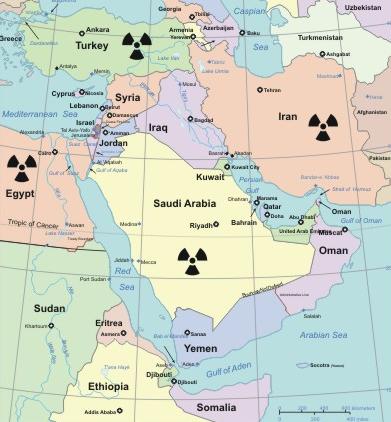Rumours of an Israeli attack on Iran continue to make headlines,
and Israel’s Prime Minister Binyamin Netanyahu persists in adding more fuel to the fire, stating
in his Holocaust Memorial Day address that: “Today, the regime in Iran openly
calls and determinedly works for our destruction. And it is feverishly working
to develop atomic weapons to achieve that goal.” In March, a prominent Israeli told the NCF
that his sources close to Netanyahu had told him that the bombing of Iran was to take place within
three months, a worrying claim indeed. It is no secret that Netanyahu wants to launch a primitive strike against
Iran, but is this really possible in the short term?
Israel
has a history of using primitive strikes against perceived nuclear threats. In 1981 the Israeli air force bombed the
Osirak nuclear reactor near Baghdad. And
more recently, in 2007, Israeli planes attacked a facility in Syria that was
suspected to be a nuclear reactor. With
this in mind one can conclude that Israel has the potential to act unilaterally in an attempt
to preserve its nuclear hegemony over the Middle East.
Regardless
of past history, experts believe that the Israelis lack the hardware to launch
an effective, coordinated strike against Iranian nuclear facilities. Firstly there is the simply matter of
distance - the potential targets in Iran are approximately 1,000 miles away
from IDF’s airbases. To launch strikes against
Iran, Israel would have to make use of their versions of the American made F-15
and F-16 fighter bombers, because the generation of cruise missiles the Israelis
currently have would not possess the required power to destroy the targets. As a result an attack would have to come for
close range and strike fighters are Israel’s only option.
Being
tied to the use of medium range fighter bombers means refuelling is a major
issue; Israel only has between eight-to-ten tanker aircraft, which would be too
few to support an effective attack. Recently
there were leaked reports that Israel was buying up old soviet airfields in Azerbaijan
as a possible base for launching attacks on Iran, but it is debatable if these
airfields will provide the logistical flexibility that will be the difference between
an attack taking place or not.
Realistically
Israel needs support from the United States if it is to attack Iran. Firstly it needs more tanker aircraft, and
secondly Israel would want more ‘bunker-busting’ bombs. Currently Israel has the 5,000 lbs GBU-28
bomb, but they would like more modern, more powerful bombs and the platforms to
the deliver them. Ideally, hardware like the 30,000 lbs Massive Ordinance Penetrator
or GBU-57A/B, and the American strategic bombers required to deliver it. Realistically they would need operational
coordination with the Americans on a joint strike mission, not just logistical
support, to ensure that a strikes against Iran’s nuclear plants are decisive,
and secondly, that an Iranian counter-strike is minimal.
However
Washington is not keen to back Israel in a strike against Iran. President Obama's primary concern is the
election in November of this year. While
Obama will want to appear to be tough on Iran he will not want to be dragged
into another foreign war. Without the support of the Americans it is
very unlikely that Israel could achieve its goals of knocking out Iran’s
nuclear infrastructure and its ability to counter attack.
Chairman of
the US Joint Chiefs of staff, Gen Martin Dempsey, publically doubted the effectiveness
of an Israel attack; such a strike, he said, "would be destabilising and
would not achieve their long-term objectives". While
Douglas Barrie from the International Institute for Strategic Studies
believes that: “Even if successful, it would
only delay Iran's nuclear programme”.
Today
head of the IDF Lieutenant General Benny Gantz announced to the media that he
did not believe Iran was attempting to weaponize its nuclear
program. He when as far to indirectly address
Netanyahu’s push for war, asserting that “the state of Israel is the strongest in the
region and will remain so. Decisions can and must be made carefully, out of
historic responsibility but without hysteria.”
Gantz’s
comments contradict Netanyahu's stance on Iran, and are more in keeping with the
broader feeling of the international community. Iran seems to be working
more openly with other powers, and the recent P5+1 nuclear talks in Istanbul
were broadly considered to have been progressive (as this recent blog by the NCF highlighted). It is very unlikely that the wider global community
would praise a preemptive strike against Iran by the Israelis, even if the majority
are against Iran being a nuclear State.
For this commentator at least, an attack on Iran from the Israeli’s
seems highly unlikely currently. An attack would
be very unpopular amongst the international community and possibly alienate Israel
from the US, who want to avoid conflict with Iran in the short term. Furthermore, if an attack is conducted by
Israel alone it is unlikely to be successful; Israel simply does not have to means to ensure
all their objectives are completed successfully. There is also a danger that an attack will only act to spur on Iran, convincing them that they need a nuclear deterrent to ensure they are safe from Israeli
attacks. Netanyahu’s rhetoric regarding Iran is still
deeply concerning, but at least in the short term, an attack seems unlikely.



